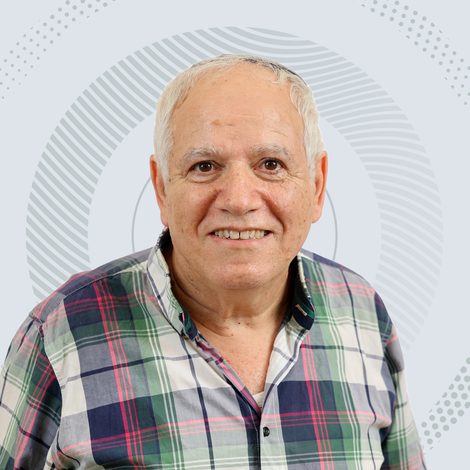
Prof. Emeritus Benny Motro
CV
Education
1977-1980, BSc, with honors, in Agriculture
Dept. of Microbiology, Faculty of Agriculture
Hebrew University of Jerusalem, Rehovot
1981-1982, MSc, with honors
Dept. of Microbiology, Faculty of Agriculture
Hebrew University of Jerusalem, Rehovot
1985-1989, PhD
Dept. of Virology, Faculty of Medicine
Hebrew University, Jerusalem
1990-1993, POSTDOCTORAL RESEARCH FELLOW
Molecular and Developmental Biology
Dr. Alan Bernstein's laboratory, Mount Sinai Hospital Research Institute
Toronto, Canada
1991-1993, FELLOW
Leukemia Research Fund, Canada
1993-1996, FELLOW
Yigal Alon Fellowship
Positions
2002-present, SENIOR LECTURER
Cellular and Developmental Biology
The Mina & Everard Goodman Faculty of Life Sciences
Bar-Ilan University, Ramat-Gan, Israel
Oct 2001-Feb 2002, SABBATICAL, Developmental Biology
Dr. Alan Bernstein’s laboratory, Mount Sinai Hospital Research Institute
Toronto, Canada
1993-2002, LECTURER
Cellular and Developmental Biology
Faculty of Life Sciences, Bar-Ilan University
Ramat-Gan, Israel
1983-1984, RESEARCH ASSOCIATE
Composting of organic wastes for CO2 production
Migal Laboratories, Kiryat Shmona
Organization of conference
1997, Gene Targeting in vivo – the Impact of Gene Targeting
Ayelet Hashachar, Israel
Participation in Meetings of the EU consortium on
“Development of an Implanted Biosensor for Continuous
Care and Monitoring System of Diabetic Patients”:
Kick-off Meeting, Munich, Germany, Sept 12-13 2006
Six Months Meeting, Tel-Aviv, Feb 27-28, 2007
1st Year Review Meeting, Como, Italy, July 16-18, 2007
Executive Board Meeting, Munich, Germany, Dec 13-14, 2007
18 Months Meeting, Prague, Feb 27 – March 1, 2008
Research
1. The cellular and developmental roles of the mammalian Nek kinases:
Protein phosphorylation by protein kinases plays a critical role in orchestrating mammalian embryonic development and in cell cycle control. The NIMA-related kinases (NRKs) family of protein kinase is recently emerging as evolutionarily conserved, cell cycle regulatory proteins. Mammalian genomes harbor 11 members of this family (designated Nek), several of which were first cloned and characterized in our laboratory. However, their functions are still mainly enigmatic. Using overexpression and down-regulation approaches, we demonstrated that Nek7 is localized to the centrosome and is critical for the correct chromosomal segregation. Interestingly, our recent work revealed involvement of Nek1 in primary cilium formation. The primary cilium serves as an antenna sensing the physical and biochemical environment of the cell, and its disruption has been shown to be involved in multiple disorders and diseases including polycystic kidney diseases (PKD). Nek1 mutant mice indeed suffer from PKD, and we are currently exploring the ciliary - PKD phenotypes.
The ultimate approach to decipher the spectrum of functions of a specific gene is its inactivation by gene targeting. We recently applied this complicated technique to create mice deficient of several of the murine Nek kinases. The developmental and cellular consequences of Nek kinase loss is currently being investigated with the emphasis on possible chromosomal mis-segregations and ciliopathies.
2. Development of implantable glucose sensor:
Diabetes is one of the most common and devastating chronic diseases in humans. To stabilize blood glucose levels (BGL) daily and to allow normal life, diabetic patients must constantly monitor their BGL. A project (designated P. Cezanne) funded under the Sixth Framework Programme of the European Community is aimed at developing an implantable sensor for continuous monitoring of BGL. The consortium is multinational and multidisciplinary, and our group (in collaboration with Prof. Shulamit Michaeli's group) is responsible for the development of cells harboring a biological sensor sensitive to glucose levels. This task is highly challenging as the cells should survive in quite a harsh environment for at least half a year while stably expressing the sensor.
Last Updated Date : 25/11/2025



